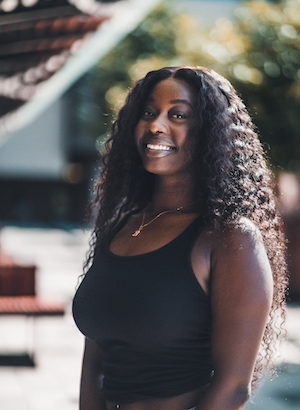Humans of Macquarie
Rebecca Nyarnhom was just three when her family fled civil war in Sudan for the safety of Australia. After the tragic drowning of her nephew in 2021, Rebecca decided she would use her study of sociology to improve water safety among migrant communities.
“My father was a fighter in the Sudan People’s Liberation Army. When we came to Australia on humanitarian visas in 2005, he stayed behind to fight. So mum was on her own with seven children. She had a really hard time at first. She didn’t have much financial support. We moved around a lot. When my eldest brother graduated in pharmacy, we were finally able to buy a family home in Campbelltown.
Mum really values education. It was one of the reasons she was so adamant about bringing us here. She never went to school herself – she was married at 14 years of age and started having babies straight away. She was so happy we had the opportunity to go to school and be educated. Two of my brothers have bachelor degrees now and one has a master degree.
I’m studying to be a sociologist. Understanding how societies work – and being able to explain it to others – hopefully means I can be an advocate for migrant communities and help interpret the problem of water safety for the government.
My nephew’s name was Riing. He was 15 when he drowned. He was swimming with his friends in the Georges River. He didn’t understand that he couldn’t swim in deep water.
I’ve never felt anything like I did that day when I found out. When you realise that someone so important to you is gone. As his auntie, I just had this overwhelming feeling to want to fix it. To save him. I wanted to say, ‘I’ll go to the river and get him.’ But I couldn’t.
In the weeks afterwards, preparing for his funeral, I kept thinking, ‘Why did this have to happen to my family?’ Then it started to shift to a different feeling. I didn’t want any other families to experience the tragedy we had experienced. I urgently wanted every child to learn to swim, right then and there.
When you come to Australia as a migrant, you don’t realise how much you’re going to be surrounded by water. South Sudan is land locked – there are rivers, but ‘going for a swim in the Nile’ just isn’t a thing. To most new migrant kids in Sydney, beaches are completely foreign.
I would love to go to South Sudan one day. Mum really wants us to, but I’m not sure I’m ready. Even though I was raised as a South Sudanese woman, all I know is Australia and Western values. I think I’d struggle to assimilate.
Because of how I look, I do sometimes experience microaggressions from white Australians. I probably always will. But the way I handle racism now has changed as I’ve become older. I can shut it down because I can articulate myself. I can question the person who is being oppressive: ‘What makes you more Australian than me?’
It hurts so much when I see newspapers sensationalising stories about African gangs. South Sudanese are some of the most generous and welcoming people you will ever meet. Most South Sudanese people will say they’re proud to be Australian but when people aren’t willing to look beyond a stereotype, you start to think, ‘What’s the point of trying?’. It’s places like Macquarie where these perspectives can be changed. Education is the key. And also saying hello. A friendly hello to a Sudanese person will always get you a smile. We’re pretty famous for our smiles.
You can donate to Royal Life Saving Australia’s Swim and Survive program, which provides swimming and water safety courses for socially or economically disadvantaged children.


 Back to homepage
Back to homepage
Love this new series! What an inspiring woman.
A very moving story. All power to Rebecca